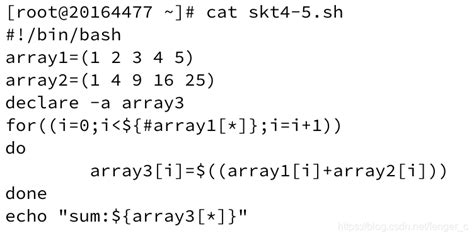shell编程100例
Title: Mastering Shell Scripting: A Comprehensive Guide
HTML格式:
```html
Mastering Shell Scripting: A Comprehensive Guide
Shell scripting is a powerful tool for automating tasks and managing system configurations in Unixlike operating systems. Whether you're a beginner or an experienced user, mastering shell scripting can significantly enhance your productivity and efficiency. In this comprehensive guide, we'll cover the fundamentals of shell scripting and provide practical tips and examples to help you become proficient in writing shell scripts.
Shell scripting involves writing a series of commands for the shell (commandline interpreter) to execute. It allows users to automate repetitive tasks, manage files and directories, and perform system administration tasks.
To start writing shell scripts, you'll need a text editor and a basic understanding of shell commands and syntax. The most commonly used shell in Unixlike systems is Bash (Bourne Again Shell).
Shell scripts typically start with a shebang line (!/bin/bash) to specify the shell interpreter. They consist of commands, control structures (such as loops and conditionals), variables, and functions.
Shell scripts support various data types, including strings, integers, and arrays. Understanding how to declare and manipulate variables is essential for writing effective scripts.
Control structures like if statements, for loops, and while loops enable you to control the flow of your script based on conditions and iterate over data sets.
Functions allow you to modularize your code by encapsulating reusable logic. They improve code readability and maintainability.
Shell scripts can take input from users, commandline arguments, or files, and produce output to the terminal or files. Understanding how to handle input and output streams is crucial.

Shell scripts can perform various operations on files and directories, such as creating, deleting, moving, and copying them. These operations are fundamental for managing system configurations and data.
Effective error handling ensures that your scripts gracefully handle unexpected situations and provide meaningful error messages to users. Techniques like error checking and logging are essential for robust scripts.
Advanced shell scripting topics include process management, signal handling, regular expressions, and interacting with external commands and programs. Mastery of these topics empowers you to tackle complex scripting tasks.
Adhering to best practices such as writing modular and welldocumented code, using meaningful variable names, and testing your scripts thoroughly ensures maintainable and reliable shell scripts.
There are numerous online tutorials, books, and community forums dedicated to shell scripting. Continuously expanding your knowledge and skills through practice and learning from others' experiences is key to mastering shell scripting.
Shell scripting is a valuable skill for system administrators, software developers, and anyone working in a Unixlike environment. By mastering shell scripting fundamentals and practicing regularly, you can streamline your workflow, automate tedious tasks, and become a more efficient user.
Remember, the journey to mastering shell scripting may seem daunting at first, but with persistence and dedication, you can achieve proficiency and reap the benefits of automation and efficiency in your work.
